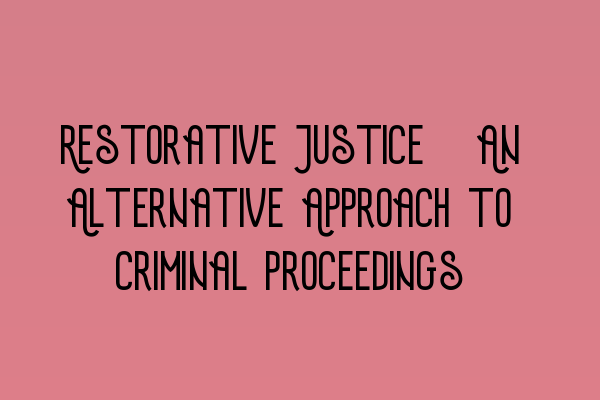Restorative Justice: An Alternative Approach to Criminal Proceedings
In the realm of criminal law, traditional proceedings have long focused on punishment rather than the personal needs of the individuals involved. However, there is an alternative approach that aims to address the harm caused by crime and allows for the restoration of relationships between victims, offenders, and communities. This approach is known as restorative justice.
What is Restorative Justice?
Restorative justice is a process that involves bringing together those most affected by a crime – the victim, the offender, and sometimes community members – to facilitate communication, understanding, and accountability. It aims to repair the harm caused by the offense and find ways to prevent future incidents.
In traditional criminal proceedings, the focus is primarily on punishing the offender, often leaving victims feeling marginalized and not heard. Restorative justice, on the other hand, recognizes the emotional and psychological impact that crime can have on victims and aims to provide them with a voice and an opportunity to participate in the resolution process.
Key Principles of Restorative Justice
Restorative justice is guided by several key principles:
- Inclusion: All parties affected by the crime have the opportunity to be involved in the process and have their perspectives heard.
- Empowerment: Victims are empowered by allowing them to express their feelings, ask questions, and have a say in how the harm is addressed.
- Accountability: Offenders are held accountable for their actions through actively acknowledging the harm they have caused and taking steps to repair it.
- Reparation: The focus is on repairing the damage caused by the offense, whether through direct compensation, community service, or other measures.
- Community Involvement: Where appropriate, the wider community can play a role in the restorative justice process, offering support and facilitating reintegration.
The Benefits of Restorative Justice
Restorative justice offers several significant benefits:
- It allows victims to have a voice and be actively involved in the resolution, helping them to heal and regain a sense of control.
- It can lead to higher rates of offender accountability, as they are given the opportunity to face the consequences of their actions and take steps towards rehabilitation.
- It promotes understanding and empathy between victims and offenders, fostering the possibility of forgiveness and reconciliation.
- It provides a more holistic and comprehensive approach to addressing the harm caused by crime, considering the needs of all parties involved.
Implementing Restorative Justice in the UK Legal System
Restorative justice programs have been implemented in various forms in the UK legal system, offering an alternative to traditional criminal proceedings. These programs can be voluntary or court-mandated, depending on the circumstances. They typically involve trained facilitators who guide the process and ensure that it remains fair and respectful to all participants.
While restorative justice is not suitable for every case, it can be particularly effective in cases where there is a desire for resolution, and both parties are willing to engage in the process. It has been successfully used in cases ranging from minor offenses to serious crimes, and its benefits continue to be recognized by professionals in the legal field.
Conclusion
Restorative justice offers a valuable alternative approach to traditional criminal proceedings, focusing on repairing the harm caused by crime and promoting healing, accountability, and reconciliation. By bringing together victims, offenders, and communities, it allows for a more comprehensive and meaningful resolution that takes into account the needs and voices of all involved parties.
If you’re interested in learning more about criminal law and practice in the UK, be sure to check out our related articles:
- SQE Exam Prep: Essential Study Materials for Aspiring Solicitors
- Expert Testimonies in UK Courts: Building Strong Cases
- Demystifying the Solicitors Qualifying Examination Format
- SQE Exam for International Lawyers: Challenges and Success Strategies
- LLC Formation Made Simple: Step-by-Step Guide for UK Entrepreneurs
At SQE Criminal Law & Practice Law UK, we are dedicated to providing expert legal knowledge and resources to aspiring solicitors and legal professionals. If you have any questions or would like to learn more about our services, please contact us.
